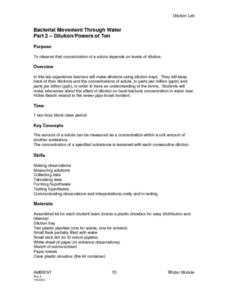Baylor College
What Is a One Part Per Million Solution?
Water may appear to be crystal clear, but there could be dissolved substances present. Lab groups make a one-part-per-million of a food coloring solution to demonstrate this concept. As part of an outstanding unit about water, this...
Curated OER
Measuring Quantities of Gases Activity
Learners use a pipette to mix small amounts of food coloring into water. They visualize the small quantities of parts per million and parts per billion. Contrary to the title, the lesson is about liquid amounts rather than gas amounts....
Curated OER
Finding Concentration
In this determining concentration worksheet, students are given the equations to find the concentration of a solution in grams per milliliter, to determine the concentration in parts per million, to determine percent mass and percent...
Curated OER
Parts-Per-Million Concentration Lab
Students develop a comprehension of parts per million as a concept. They work in teams to create successive dilutions of a solution to reach a parts-per-million concentration. Students list what they think the atmosphere is made of. They...
Curated OER
Bacterial Movement Through Water Part 2- Dilution/Powers of Ten
Students make dilutions using dulution trays. They keep track of their dilutions and the concentrations of solute, to parts per million (ppm) and parts per billion (ppb), in order to have an comprehension of the terms. Students make...
Curated OER
How Small is It?
High schoolers better understand what a concentration of one part per million means through activities. Students discuss "Maximum Contaminant Level" of a toxic in the water. They measure the classroom to find out how many cubic...
Curated OER
Is It Safe To Go In?
Students examine acceptable levels of toxins in swimming areas. Working in groups of four, students dilute a salt or sugar solution to 1 part per 1,000,000 (ppm) solution. Students taste test their diluted liquids and record at which...








